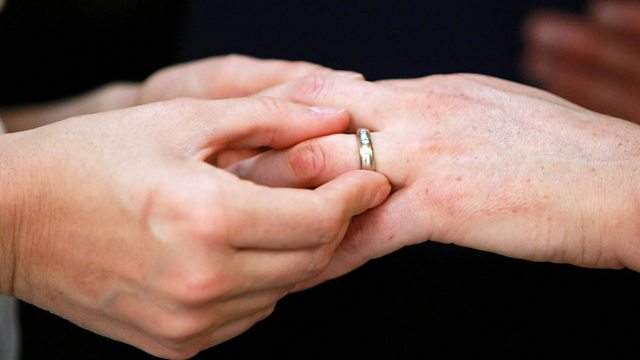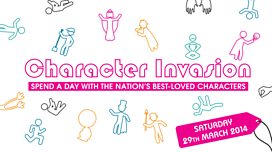Lesbian wives; Deborah Ellis; Female characters in drama; Helen Fielding
Jenni Murray presents the female perspective on the world, discussing lesbian wives, author and activist Deborah Ellis, female characters in drama, and author Helen Fielding.
On Saturday 29th March the first same sex marriage ceremonies will take place in England & Wales. Couples will have the right to legally refer to their spouse as "husband" or "wife". How comfortable will lesbians be with calling their spouse wife? The Canadian author & peace activist, Deborah Ellis, visited refugee camps in Pakistan to talk to women and children who had fled the Taliban, and turned those experiences into novels for children. Her latest book, My Name is Parvana, tells the story of a young girl in post-Taliban Afghanistan. �鶹������ҳ��� Writers Room script reader and theatre critic Sally Stott has read thousands of scripts in a search for new talent. In many of the stories, she says, the female characters are badly described & characterised and focus heavily on physical appearance. Why does it seems so hard to write a decent female character? And as part of Radio 4's Character Invasion writers have been talking about which of their own creations is their favourite - Helen Fielding talks about Bridget Jones.
Last on
![]()
Find out more about Radio 4's Character Invasion
Clips
Chapters
-
Lesbian Wives
Melanie Rickey and Alice Arnold on what to wear and what to call your lesbian wife.
Duration: 12:35
Deborah Ellis
Deborah Ellis is a Canadian author who has spent time in refugee camps in Pakistan.
Duration: 07:36
Writing Female Characters
Sally Stott and Farah Abushwesha ask why good female characters are scarce in new writing
Character invasion - Helen Fielding on Bridget Jones
Helen Fielding talks about Bridget Jones, the lead character in her bestselling novels.
Duration: 06:13
Lumberjills
During the War some 9,000 British women were recruited to work in forestry.
Duration: 06:45
Is there a correct name for a lesbian spouse?
On Saturday 29th March the first same sex marriage ceremonies will take place in England & Wales. For the first time, gay and lesbian people who choose to get married will have the same rights as heterosexual married couples, including the right to legally refer to their spouse as “husband” or “wife”. But, given the history of patriarchy connected with marriage, when in the past many wives were in fact seen as the property of their husbands, how comfortable will lesbians feel using the term “wife” to refer both to their partner and to themselves? Many heterosexual married couples prefer alternative terms like “other half” or “significant other” – but are these terms appropriate for lesbians, or should they insist on using “wife” in order to mark the social milestone that is their marriage? Jenni speaks to former �鶹������ҳ��� Radio 4 newsreader Alice Arnold, who is currently in a civil partnership with the broadcaster Clare Balding and plans to marry in the future, and Sue Wilkinson, who married her partner Celia Kitzinger in Canada in 2003 and subsequently fought to have their marriage legally recognised in the UK.
Deborah Ellis
Deborah Ellis is a Canadian author who, as a peace activist, has spent time in refugee camps in Pakistan talking to women and children who have fled the Taliban and she has turned those experiences into novels for children. Her latest book, My Name is Parvana, tells the story of a young girl in post-Taliban Afghanistan and her struggles to survive and get an education.
Writing female characters
and theatre critic Sally Stott has read thousands of scripts in a search for new talent. In many of the scripts, she says, the female characters are badly described & characterised, frequently derogatory or incongruous and focus heavily on physical appearance. To discuss why it seems so hard to write a decent female character Sally Stott joins Jenni in the studio along with Farah Abushwesha, writer & film producer, founder of the .
Character invasion - Helen Fielding on Bridget Jones
As part of Radio 4’s which takes place this Saturday 29th March, five writers talk about which of their own creations is their favourite. Helen Fielding talks about Bridget Jones, the lead character in her bestselling novels. She explains how she wrote the character and why she (and so many readers) have such great affection for Bridget.
Lumberjills
![Lumberjills]()
In 1942, the Government formed the Women’s Timber Corps. And during the war some 9,000 British women were recruited to work in forestry. They were known, unsurprisingly, as ‘Lumberjills’, and they replaced the men who’d gone to the front. Their job was to fell trees, load lorries and mill timber all over England and Scotland. Caz Graham met a former Lumberjill, Edna Holland, and Sarah Bell who now works as a forester.
Credits
Role Contributor Presenter Jenni Murray Interviewed Guest Sally Stott Interviewed Guest Helen Fielding Producer Jane Worsley Broadcast
- Fri 28 Mar 2014 10:00�鶹������ҳ��� Radio 4
Follow us on Instagram
Get all the pictures, videos, behind the scenes and more from Woman’s Hour
Podcast
-
![]()
Woman's Hour
Women's voices and women's lives - topical conversations to inform, challenge and inspire.






